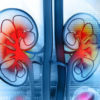Experiencing dyspnea, commonly known as shortness of breath, can be a frightening experience. Fortunately, there are many options for treating both acute and chronic dyspnea. Located in northern New Jersey and serving patients throughout the surrounding area, Bergen Medical Associates has an expert medical team that can diagnose and treat dyspnea.
Dyspnea
Dyspnea Care in Northern New Jersey
What Is Dyspnea?
Dyspnea is the medical term for shortness of breath that may be mild, moderate, or severe. When a patient experiences dyspnea, they feel like they cannot get enough air into their lungs to breathe deeply. Their chest might feel tight and breathing can be uncomfortable or painful. Acute dyspnea lasts for a few minutes or hours, while chronic dyspnea can last for a month or more. Some patients have intermittent dyspnea, which can come and go depending on different factors. Chronic dyspnea can disrupt a patient’s quality of life and limit the activities they can do.
What Conditions Can Cause Dyspnea?
 Dyspnea can be difficult to diagnose because there are so many different conditions that can cause it. However, most cases of shortness of breath are linked to heart and lung disease. Causes of dyspnea include:
Dyspnea can be difficult to diagnose because there are so many different conditions that can cause it. However, most cases of shortness of breath are linked to heart and lung disease. Causes of dyspnea include:
- Pulmonary conditions: Patients with chronic obstructive pulmonary disease (COPD), pulmonary edema, pneumonia, and other lung problems are more likely to have dyspnea.
- Cardiovascular conditions: Congestive heart failure, cardiomyopathy, and other cardiac conditions can lead to a buildup of fluid around the heart that makes it difficult to breathe well.
- Respiratory issues: Conditions such as emphysema and chronic bronchitis lead to shortness of breath.
- Cancer: Dyspnea can be a side effect of cancer treatments such as radiation and chemotherapy.
- Gastroesophageal reflux disease (GERD): If a patient has GERD, stomach acid may enter their lungs and cause their airways to swell, resulting in dyspnea.
- Psychological factors: Conditions such as anxiety and depression can cause a patient to hyperventilate.
- Anemia: An iron deficiency makes it more difficult for oxygen to circulate throughout the body, leading to shortness of breath.
Certain factors like a patient’s medical history, family history, and other underlying health conditions may increase the risk of dyspnea. Patients who smoke or who rarely exercise can be more likely to experience shortness of breath.
How Is Dyspnea Diagnosed?
If a patient has dyspnea, their doctor may review their health history, current lifestyle, and any other symptoms. To gauge severity, they might ask how the condition affects the patient’s life, such as:
- Is the patient able to exercise?
- How far can they walk without getting winded?
- What triggers the patient’s dyspnea, and does anything help make it better?
If a person has already been diagnosed with a condition such as COPD or emphysema, the cause of dyspnea is clear. However, if their provider isn’t sure what is causing shortness of breath, they may order diagnostic tests such as blood work, lung function tests, and X-rays or CT scans. The patient may also be referred to a specialist such as a cardiologist or a gastroenterologist if a specific medical condition is causing or exacerbating their dyspnea.
Treatment Options for Dyspnea
Treatment of dyspnea will depend on the underlying condition that is affecting the patient’s breathing. Medications that can help with dyspnea include:
- Antibiotics to treat lung infections
- Corticosteroids to reduce swelling and inflammation in the lungs
- Bronchodilators, which open the airways
- Pain medication
- Anti-anxiety medication
Patients with pulmonary disease also may need an oxygen tank to help them get enough air.
In some cases, surgery may be required to treat chronic, moderate to severe dyspnea. Surgical treatments can address certain conditions that cause shortness of breath, including:
- Lung tumors
- Structural heart disease
- Chronic blood clots
For some patients, dyspnea is caused or exacerbated by anxiety. Breathing and relaxation techniques can reduce or control shortness of breath. Complementary therapies, including physical therapy, acupressure, meditation, and reflexology also may help patients stay calm and control their breathing.
Trust Bergen Medical Associates for Dyspnea Care
Patients can receive personalized treatment for dyspnea and other chronic conditions at Bergen Medical Associates. In addition to comprehensive primary care, the medical team offers a wide range of specialties, including:
Bergen Medical Associates has multiple locations throughout northern New Jersey so patients can receive care from an experienced, board-certified provider close to home. For more information, request an appointment or contact us today.










